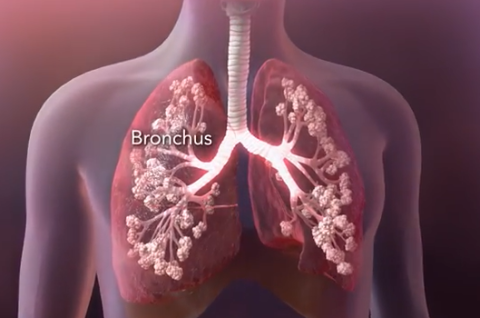Cystic fibrosis (CF) is a progressive genetic condition that causes recurrent respiratory infections and limits a patient’s ability to breathe over time.
A variety of different mutations in the CTFR gene can cause the condition. These mutations prevent certain proteins from functioning correctly, resulting in an accumulation of thick, sticky mucus in the respiratory tract. The mucus both clogs airways and traps pathogens, which can result in lung infections.
Although medical advancements such as airway clearing strategies, therapy vests and inhalers have greatly improved the prognosis for patients with CF, lung infections still pose a major threat. Up to 80% of adults with CF suffer from a particular type of lung infection caused by the bacteria Pseudomonas aeruginosa. While it can sometimes be treated with antibiotics in its early stages, antibiotics are no longer effective once the infection has become chronic. Drug-resistant strains of this bacteria can be especially deadly to CF patients.
Recently, a number of promising new CF therapies have come to the fore, including “Phage Therapy”. Scientists have long exploited genetically modified bacteria in order to produce therapeutic proteins such as insulin, but they are now using bacteriophages as well. (A bacteriophage is a type of virus that naturally infects bacteria.) Researchers have sought to harness several strains of these viruses and to use them to target the dangerous Pseudomonas aeruginosa. Recently, researchers showed that this technique can be successful in animal trials, and the treatment has great potential to be successful in humans. In the future, researchers hope to more effectively reverse-engineer these phages to attack specific kinds of pathogens.
Drug-resistant “superbugs” are a tremendous threat to all humans, not merely to those with CF. As the supply of effective antibiotics has progressively dwindled, our hope of winning this bacterial arms race has done likewise. Perhaps “Phage Therapy” is the solution we have been searching for.
For More on Cystic Fibrosis:
-
ABE Cystic Fibrosis Module (requires log-in)
